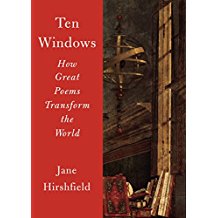Ten Windows: How Great Poems Transform the World, Jane Hirshfield, 2015
This is an inspiring, beautiful, and important book of literary criticism. Hirshfield, a much awarded poet living in Northern California, has used ten themes to try to describe the magic of poetry (and, all art) and how it is achieved. My notes ran to pages as every chapter has many quotable and deeply thoughtful sentences. Her insights are quite remarkable and worth re-reading many times to the point that I will go out and buy this book which I had borrowed from the library, having seen it on the shelf one day at CPL. The ten windows through which she views poetry are: the eyes, language, image, the hidden, uncertainty, windows, surprise, ‘what is American?’, transformation and lacrimae rerum, impossibility. In each chapter she uses poems and poets, familiar and totally new to me, to illustrate her points. Here are some of her more cogent observations: ‘Good art is a truing of vision’. ‘Entering a good poem, a person feels, tastes, hears, thinks, and sees in an altered way.” ‘ Why ask art into our lives if not to be transformed and enlarged by its presence and mysterious means.” These are all from the introduction, and every chapter provides more wonderful and spot-on observations. The poems are also superb and superbly chosen with Bishop, Auden, Pound, Dickinson, Whitman, and dozens of others cited. I could go on for another few pages, but will simply state that this along with the Clive James book are a perfect introduction for anyone seeking to achieve a deeper understanding and appreciation of this mystery called a poem—-‘a cup of words filled past its brim, carrying meanings beyond its own measurable capacity….a good through-passage, words that leave the poet, reader, and themselves measurably changed—an alteration of being.” Well said, Jane!



